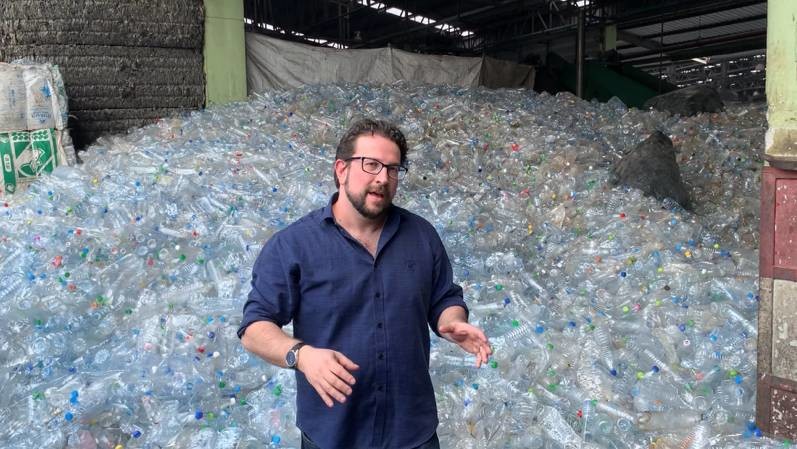By Raffi Schieir, recycling expert and Director of Bantam Materials, the supplier of Prevented Ocean Plastic.
Millions of plastic bottles choking our oceans and waterways are some of the most powerful images of the environmental catastrophe that is unfolding before us. They have moved people to do more to reduce waste and commit to recycling.
However, the truth is, if we want recycling to work – and to clean up our beaches and the natural environment from plastic – we need to look beyond our recycling bin towards what we purchase and put in our fridge and our home.
If you’re keen to reduce the environmental impact of your weekly shop, here are my top tips on where to start:
Look out for recycled content
There is enough plastic in our world already, and new plastic, made from oil and petrochemicals, generates five times the amount of carbon emissions in its production and transport compared to recycled plastic.
The terms recycled and recyclable are not the same. Many recyclable plastics will continue to end their life as pollution unless we all choose to use or buy recycled plastics. Buying already recycled plastic helps drive collection of discarded plastic so it can replace new plastic, save our oceans from devasting pollution and cut carbon emissions.
Choose plastic with recycled content
This guarantees that recycling has already happened and levels of virgin plastic used have been reduced. Options like Prevented Ocean Plastic divert plastic away from our oceans, support coastal communities in developing countries by supporting bottle collectors, collection centres and local recyclers based there. Look out for the Prevented Ocean Plastic blue triangle logo on the pack.
Get to know the products packaged in recycled content
This might seem time-intensive but once you know the good guys you can easily pick them up time after time.
Get to know your local recycling
Somewhat shockingly only 9% of plastic ever produced has been recycled and, given 66% of British adults don’t know how to recycle some types of plastic packaging, it’s fair to say that most of us are part of the problem.
Check your local council website to see what can be recycled in your area so you can at least make sure you’re recycling what can be.
Remember your shopping bags!
Great strides have been made to reduce single-use plastic bags since the introduction of a charge for them at supermarkets, but a study from Greenpeace in January found that UK supermarkets sold enough “bags for life” in 2020 for every household in Britain to have 57 each.
Bringing your own bags to the supermarket is so simple and saves you money! Try keeping at least one bag in your car boot and there are foldable ones that can fit in your pocket. It’s said it takes 21 days to form a habit and so why not start making ocean-friendly choices today?
About the expert
Raffi Schieir is a recycling expert and Director of Bantam Materials, the supplier of Prevented Ocean Plastic. Prevented Ocean Plastic is high quality, certified recycled plastic that has been collected from coastal areas at risk of ocean plastic pollution. Used by supermarkets and brands around the world, it meets regulatory health and safety standards, is traceable back to source and can be identified on-pack through its distinctive triangular logo.
As well as diverting plastic away from our oceans, Prevented Ocean Plastic supports coastal communities in developing countries by supporting bottle collectors, collection centres and local recyclers based there.
Prevented Ocean Plastic is supplied by Bantam Materials as part of its mission to prevent ocean plastics by providing manufacturers, retailers and consumers with a better plastic choice. As a distribution business committed to sustainability, Bantam Materials is a member of SEDEX and uses the independent certification organisation to ensure product traceability within strict labour and environmental standards.
Learn more at www.preventedoceanplastic.com

